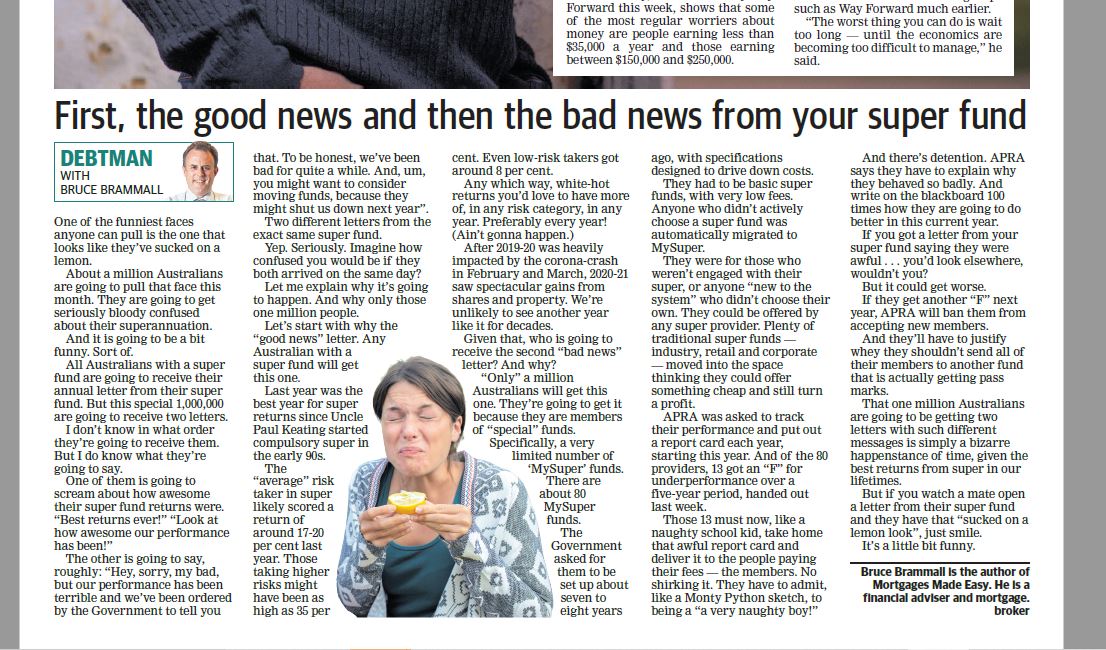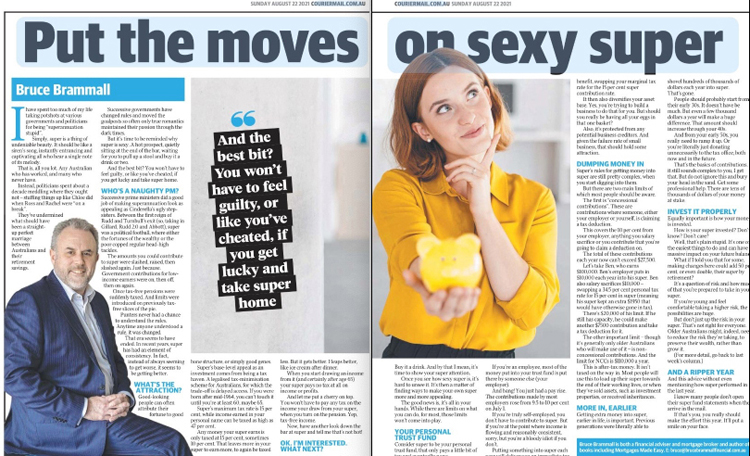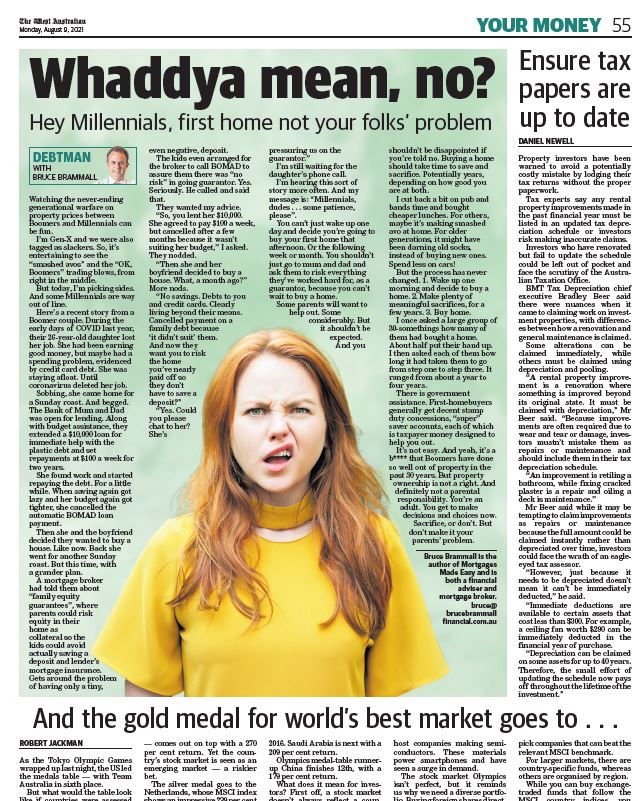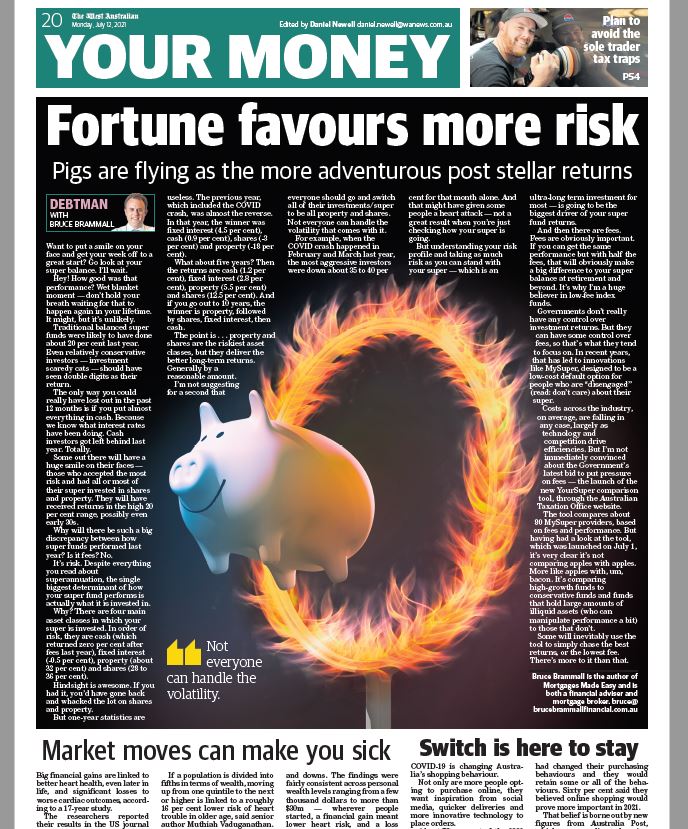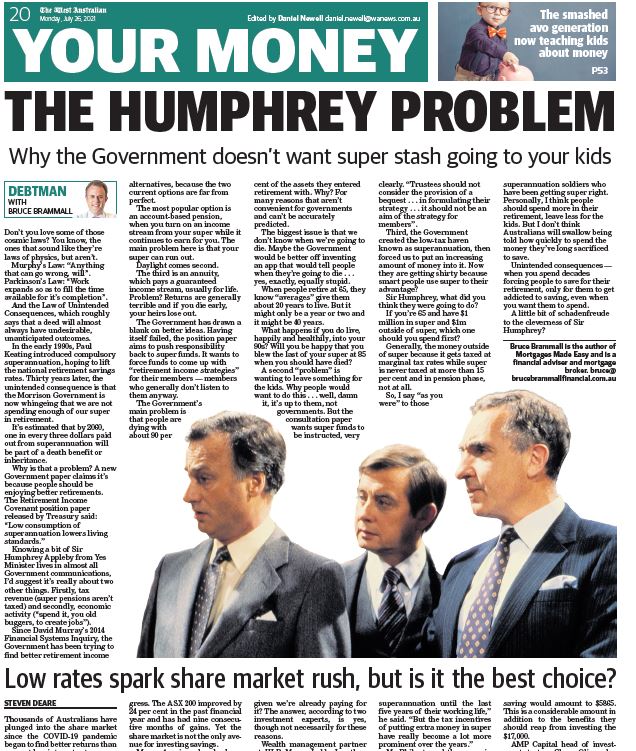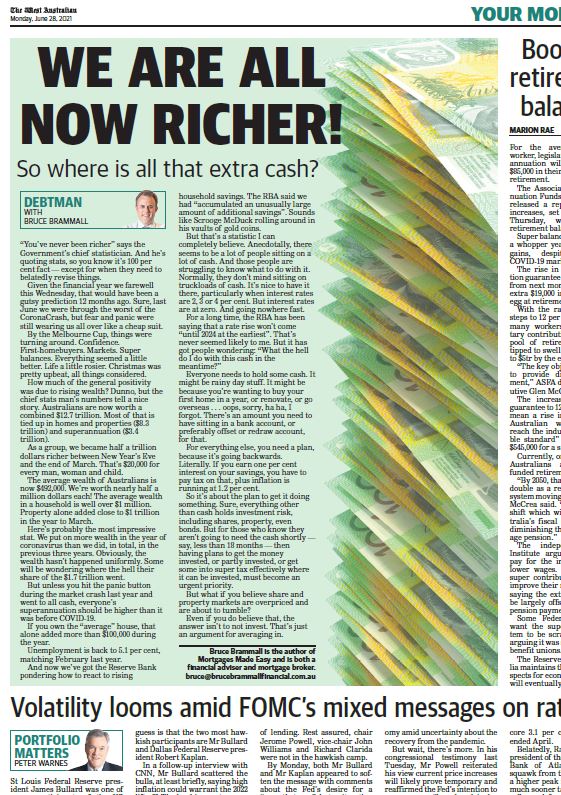Bruce Brammall, The West Australian, 6 September, 2021 One of the funniest faces anyone can pull is the one that looks like they’ve sucked on a lemon. About a … Read More First, the good news and then the bad news from your super fund
Tag Archives: Strategies to build super
Nuclear option for your super
Bruce Brammall, The Australian, 5 September, 2021 Sometimes you feel an overwhelming desire to wrest control of an aspect of your life that’s felt not quite right. You’ve been … Read More Nuclear option for your super
Building us up for a nasty fall
Bruce Brammall, The Australian, 29 August, 2021 It was all in the name of research for … Read More Building us up for a nasty fall
Put the moves on sexy super
Bruce Brammall, The Australian, 15 August, 2021 I have spent too much of my life taking potshots at various governments and politicians for being … Read More Put the moves on sexy super
The King’s Dead
Bruce Brammall, The Daily Telegraph, 15 August, 2021 Is the famous phrase “cash is king” such a truism that it can’t be argued? It has some great upsides. … Read More The King’s Dead
Waddya mean, no?
Bruce Brammall, The West Australian, 9 August, 2021 … Read More Waddya mean, no?
A new housing “crisis” knocks
Bruce Brammall, The Australian, 8 August, 2021
I love the old gag about economists and their wayward prognostications: “Economists have accurately predicted 17 of the last three recessions.”
The same joke could be made, on steroids, about housing prices: “Commentators have accurately called 159 of the last two housing affordability crises.”
Any time house prices rise a bit faster than normal, hit a new record, or go on a canter for a little longer than usual, commentary suddenly jerks to “affordability crisis”.
We hit that point, again, months ago. This week, one editorial thundered: “Through-the-roof home prices nothing short of a crisis”.
Seriously? Can you hear a bit of Chicken Little in these “listen to me” calls?
Sure, residential property prices are up strongly since late last year. But does that mean an “affordability crisis”? Are first home buyers doomed to sit on the sidelines of the property market forever?
No. Hell no! Absolutely, positively, (insert potty-mouthed emoji) no. The opposite, in fact, is true.
If property prices are rising, buyers can afford to pay more than the prices of last month/year, to state the bleeding obvious. By definition, homes are affordable.
But those “crisis” calls keep coming and inevitably continue for months, even years, before property prices level out, or start to fall. Thousands call it wrong before someone finally gets it right.
It’s that simple.
So what do the recent price increases mean for property buyers, particularly those waiting on the on-ramp?
It means a considerable number of them were smart, fortunate or lucky enough to buy in the bargain basement, with prices forced down by the economic misfortune caused by Covid-19.
Should we accuse them of being bottom feeders? Vultures preying on coronavirus victims, forced to sell their properties at a discount to their true value?
Of course not. (Though it’s closer to being true than an “affordability crisis”.)
There are two main type of property owners – home buyers and investors.
Home buyers are looking for somewhere to live that meets their personal emotional needs. It might be near the kids’ schools, near work, near family, near a lifestyle they enjoy.
Investors (or at least the savvy ones) want one thing and one thing only – to make money. Most aren’t being greedy about it, but they’re taking a risk in the hope of creating wealth over a holding period of decades.
Last year, for different periods depending on which state you were in, real estate sales markets essentially shut down.
Confidence shot
Buyers didn’t have confidence to buy, because they weren’t sure if they were going to have a job to pay the mortgage, if tenants would be able to afford to pay rent, if tenants could be evicted for not paying rent, if tenants hadn’t largely moved back home with parents.
Banks were offering mortgage deferrals, restricting lending and baulking at lending to those on JobKeeper salaries.
Even if you had a job, was it safe? How many pilots or restaurant owners could get a loan last year?
A flood of property was expected from distressed owners. And, in March and April last year, nobody knew how long it would go on for. Months? Years?
With next to no buyers, there is only one way property prices were expected to go.
The “haves” have it
But plenty of people did well financially out of coronavirus. Not all states, or industries, suffered the economic consequences of lockdowns equally.
Towards the end of last year, with nationwide panic subsiding, the “haves” found themselves in a good financial position, in markets which might have fallen 5-10 per cent.
Add to that interest rates cut to the bone and government stimulus was still flowing.
Those cashed-up first-home buyers pounced.
And, for the first time in probably decades, home buyers got one over on investors, particularly first-home buyers. Good for them. It’s usually landlords who come in first at the bottom of a property cycle.
There are plenty out there, still sitting on the sidelines, wondering whether they’ve missed the boat.
In all likelihood, no, property hasn’t peaked. The Reserve Bank is still claiming interest rates will remain on life support settings until 2024 and unemployment is at a cyclical low.
But, really, they’re irrelevant.
If you’re a first home buyer, you should buy when you can afford to buy. If that’s now, get some good advice around obtaining a mortgage and off you go to get yourself onto the market.
You might buy just before prices dip. But you probably won’t. When property prices dip, they rarely fall that much. They’re not like stock markets. And they usually recover withing a year or two.
Save, sacrifice, prioritise
If you’re not yet in a position to buy, the same rules as always apply. Save hard. Make sacrifices. Set yourselves targets. If this is your top priority in life, you’ve got to do whatever it takes.
Cut back on the unused gym membership. Don’t update the car/s this year or hold on to them a bit longer. Eat out less. Spend less on clothes.
Buy a sixpack and watch some Netflix with your partner instead of going to the pub on Friday.
Hahahahaaa! Clearly, I’m only talking there to the lucky few Australians not currently locked down (which does not include me and doesn’t depending on the day, it seems).
While we’re on lockdowns, let’s bastardise a line from Dan Andrews to give first-home buyers some inspiration to save: “If you can work from home, you must make your lunch at home”.
And from Gladys: “Please, even though there are still 13 legitimate reasons to leave your home and the shops are still open, we urge you to please, please, stay home and play Monopoly with the kids. Definitely, please don’t drive across town to Bondi for a coffee, please.”
Double-edged swords
What I’ve been seeing a lot of, since the “Great Return of the First-Home Buyer”, has been the conundrum of how to build a deposit faster.
Interest rates are an obvious frustration. It will be their best friend when they get a mortgage, but it’s killing them in trying to get to first base.
They load up their savings in bank deposits, earn close to nothing, get taxed on that piddling amount of interest, then watch the savings go backwards in purchasing power, at the rate of inflation.
They want a boost. And they want to know how to actually earn something while they’re saving, so it’s not just them doing all the hard work.
The first thing they want to know about is whether to tip some of the money into the stock market. The base rule there is that anytime your investment period is shorter than about 18 months, keep the lot in cash.
Stock markets can turn very nasty, very rapidly. Look no further than the corona-crash of February and March last year, where equity markets lost 35-40 per cent and listed property fell 48 per cent.
That’s just turned your joint $100,000 deposit into about $60,000.
If your timeframe is more than 18 months, then perhaps consider putting a portion of your deposit into other investment assets – fixed interest, property and shares.
And the longer the period over, say, two years until you’re likely to buy a home, the more you could potentially risk in shares and listed property. But still keep it limited.
Super savers
And consider the First Home Super Saver Scheme, a much-improved alternative of former PM Kevin Rudd’s dud of 2008.
Under the FHSSS, first-home buyers can tip in up to $15,000 a year into super, get super tax breaks worth thousands, have the money invested and taxed at super tax rates, then withdraw up to $30,000, plus earnings, to buy a home.
The FHSSS has plenty of rules around access – too many to go into here. Research properly, or get advice.
The other clear risk of FHSSS is that unless you choose a specific investment strategy in your super fund for this money, it will be invested with the rest of your super and will have the same investment returns, up or down, with investment markets.
Bruce Brammall is both a financial adviser and mortgage broker and author of books including Mortgages Made Easy. E: bruce@brucebrammallfinancial.com.au.
Look at your super balance and smile
Bruce Brammall, The West Australian, 12 July, 2021 Want to put on a smile? Go look at your super balance. I’ll wait. Hey! How good was that performance? Wet blanket … Read More Look at your super balance and smile
The Sir Humphrey Problem
Bruce Brammall, The West Australian, 26 July, 2021 Don’t you love some of those cosmic laws? You know, the ones that sound like they’re laws of physics, but aren’t. … Read More The Sir Humphrey Problem
We are all now richer!
Bruce Brammall, The West Australian, 28 June, 2021 “You’ve never been richer” says the Government’s chief statistician. And he’s quoting stats, so you know it’s 100 per cent fact. … Read More We are all now richer!
